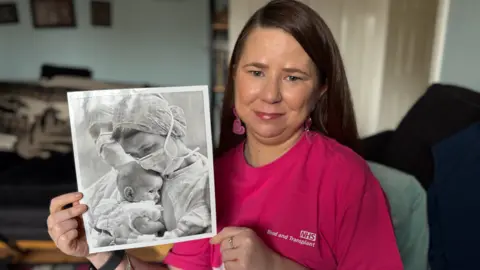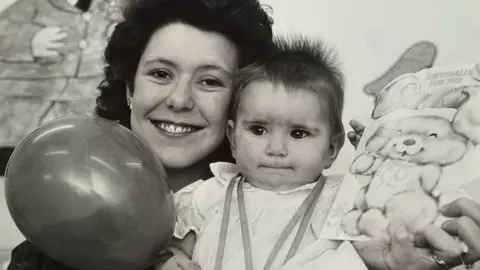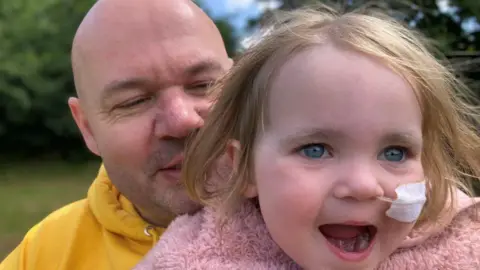'Organs are needed here, not in heaven'
 BBC
BBCA woman who was the first baby to have a heart transplant in the UK says families should not be able to overturn a loved one's decision to donate their organs.
Family-blocked donations have almost tripled from 255 in 2020/21 to 680 in 2023/24, according to official figures, leading to an estimated 2,040 "missed opportunities" last year.
Kaylee Davidson-Olley, from Houghton-le-Spring, who had transplant surgery at Newcastle's Freeman Hospital in 1987, said lives were continuing to be lost.
NHS Blood and Transplant (NHSBT) said families were "always involved" in donation and they might have "important information" which was vital in understanding whether organs were safe for donation.
Last year, families refusing donation gave reasons including not knowing what the patient wanted, feeling the donation process took too long, not wanting any further surgery to the body, or it was against religious and cultural beliefs.
Meanwhile, research carried out by Bangor University found some families did not understand the soft opt-out laws, introduced in England in 2020, where patients are presumed to have given consent for donation unless they specifically opted out of the organ donation register.
 Handout
Handout"The knock-on impact is lives won't be saved, it's as simple as that. Organs need to be used here, not in heaven," Ms Davidson-Olley, now 38, said.
"The figures [for organ donations] are extremely low, and we need to boost that up and we need public help to do that."
Ms Davidson-Olley praised the NHS, but said the sole decision to remain opted-in to the Organ Donation Register should be honoured, where appropriate.
According to the NHS, for every one donor, an average of three organs can be transplanted, potentially saving additional lives.
"You're giving a life, you're giving a gift, look at me 38 years post-transplant - I love my life and I couldn't be thankful enough to what I've been given," Ms Davidson-Olley said.
"Have the conversation [with your family] and share your wishes."
 Handout
HandoutFigures from 1 April 2023 to 31 March 2024 showed that 140 families overruled a patient's "opt-in decision".
A further 540 families did not support "deemed consent", where there is no expressed decision and so the patient is assumed to support organ donation.
In all those cases, no donation went ahead.
Terry Archbold, from Burnopfield, County Durham, whose daughter Beatrix underwent a heart transplant in 2023, previously told the BBC he and his partner were split over organ donation after their daughter Isabel was stillborn.
While his partner Cheryl agreed, Mr Archbold said he had initially refused organ donation as he had never given the subject consideration, and a "protective instinct kicked in" that "didn't want anyone to touch her".
However, it was only after having a discussion he said he realised they would be "hopefully saving other parents from experiencing the same feelings we had".
Families consulted
A spokesperson for NHSBT said families were often aware of a patient's "medical, travel and social history" and which was "vital to understanding" whether their organs were "safe to transplant", or had more recent information than a decision recorded on the donor register.
They said while families were expected to support a patient's decision to donate, the circumstances in which a person died were "often very sudden and traumatic", and said it was encouraging people to be clear with family members about their wishes.
"Families are far more likely to support donation when they already know it was what their relative wanted," the spokesperson said.
"Almost 90% of people honoured their family members decision last year when they had either registered their decision to donate on the NHS Organ Donor Register or had spoken with their family about wanting to be an organ donor."
The Department of Health and Social Care (DHSC) said it was encouraging everybody to "register their decision" which "only takes two minutes and could save up to nine lives".
A spokesperson added the DHSC was making it "as easy as possible" for those to record their preference on the register.
